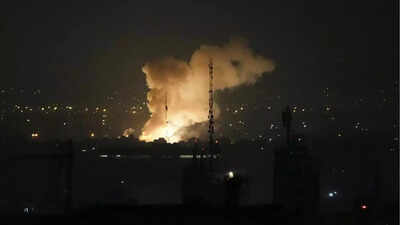ARTICLE AD BOX

Smoke rises up after an explosion in Tehran, Iran, Friday, June 13, 2025. (AP photo)
Israeli Prime Minister Benjamin Netanyahu on Friday said that Israel struck Iran's main enrichment facility in Natanz.Netanyahu said the Israeli forces also attacked Tehran's leading nuclear scientists working on the Iranian bomb and ballistic missile programme."We struck at the heart of Iran's nuclear enrichment programme. We struck at the heart of Iran's nuclear weaponisation programme. We targeted Iran's main enrichment facility in Natanz. We targeted Iran's leading nuclear scientists working on the Iranian bomb. We also struck at the heart of Iran's ballistic missile programme," Netanyahu said in an address shortly after "Operation Rising Lion".According to news agency AFP, Iranian state television also reported that an explosion was heard at a key uranium enrichment site in central Iran."New explosion heard at Natanz uranium enrichment facility" in Isfahan province, an Iranian broadcaster also reported, showing thick black smoke rising from the facility.The Israeli PM said Iran's ballistic missiles "could carry nuclear payload", threatening the lives of millions. He said, "This is an intolerable threat. It must be stopped.""Last year, Iran fired 300 ballistic missiles at Israel. Each of these missiles carries a tonne of explosives and threatens the lives of hundreds of people.
Soon, those missiles could carry a nuclear payload, threatening the lives not of hundreds, but of millions. Iran is gearing up to produce 10,000 of those ballistic missiles within three years. Now just imagine, imagine 10,000 tonnes of TNT landing on a country the size of New Jersey.
This is an intolerable threat. It must be stopped," the Israeli PM said.Netanyahu said Iran's "new plan to destroy Israel" involved surrounding the country with regional proxies and launching direct attacks, including the October 7 incident. "But the people of Israel, the soldiers of Israel rose like lions to defend our country. We crushed Hamas. We devastated Hezbollah. We hit Iranian proxies in Syria and Yemen. And when Iran directly attacked us twice last year, we struck back inside Iran itself. Yet in defending ourselves, we also defend others," he was quoted as saying by the news agency AP.The strikes hit Iran’s capital, Tehran, early Friday morning, with loud explosions echoing across the city.The Israeli PM said the attack was to roll back the threat to Israel's "very survival". Netanyahu said Israel's attack on Iran would "continue for as many days as it takes" after Israel announced it had carried out strikes on Iranian nuclear and military sites.
Why Israel attacked Natanz nuclear siteThe Natanz nuclear facility is one of Iran’s most critical and well-known nuclear sites, playing a central role in the country's uranium enrichment program. Located about 250 kilometres south of Tehran, Natanz houses thousands of centrifuges used to enrich uranium, a process that can produce fuel for nuclear power plants or, if further enriched, material for nuclear weapons. The facility has been at the heart of international concerns over Iran’s nuclear ambitions for years, making it a frequent focus of diplomatic negotiations, United Nations inspections, and covert sabotage operations. Natanz has also been the target of multiple cyberattacks and suspected Israeli-led operations aimed at slowing Iran’s nuclear progress. Its significance stems not only from its scale and technological capacity but also from its symbolic status as a key pillar of Iran’s nuclear strategy.
Any disruption at Natanz can severely impact Iran’s enrichment capabilities and serves as a powerful lever in the ongoing standoff between Tehran and Western powers over nuclear proliferation.In 2021, the Stuxnet computer virus, discovered in 2010 and widely believed to be a joint US-Israeli creation, once disrupted and destroyed Iranian centrifuges at Natanz amid an earlier period of Western fears about Tehran's program. Natanz suffered a mysterious explosion at its advanced centrifuge assembly plant in July that authorities later described as sabotage. Later, Iran rebuilt that facility deep inside a nearby mountain.
Nuclear installation in Iran
Nuclear power plant
Research reactors
Plant under construction
Uranium mine
Nuclear sites, including enrichment
Other nuclear sitesWhy attack on nuclear site significant?The attack comes amid surging tensions over Iran’s rapidly advancing nuclear programme. Just a day earlier, the International Atomic Energy Agency’s (IAEA) Board of Governors formally censured Iran for failing to cooperate with inspectors, marking the first such rebuke in two decades. In response, Iran swiftly announced plans to build a third nuclear enrichment site and to upgrade its centrifuges with more advanced models.Israel has long vowed to prevent Iran from acquiring a nuclear weapon -- something Tehran denies it is pursuing, though Iranian officials have occasionally hinted at the possibility. Meanwhile, the United States had been bracing for potential escalation, having already withdrawn some diplomats from Baghdad and offering voluntary evacuation for the families of US military personnel stationed across the Middle East.After the attack, US Secretary of State Marco Rubio said that the strikes by Israel were "unilateral" and that US' priority is now to protect the American forces in the region. Rubio said that Israel said that the strikes were done in the spirit of self-defence. He said that Iran must not harm US interests or personnel.Meanwhile, the global oil markets reacted quickly, with benchmark Brent crude prices jumping more than 2 per cent following the attack



.png)
.png)
.png)
















 18 hours ago
3
18 hours ago
3









 English (US) ·
English (US) ·